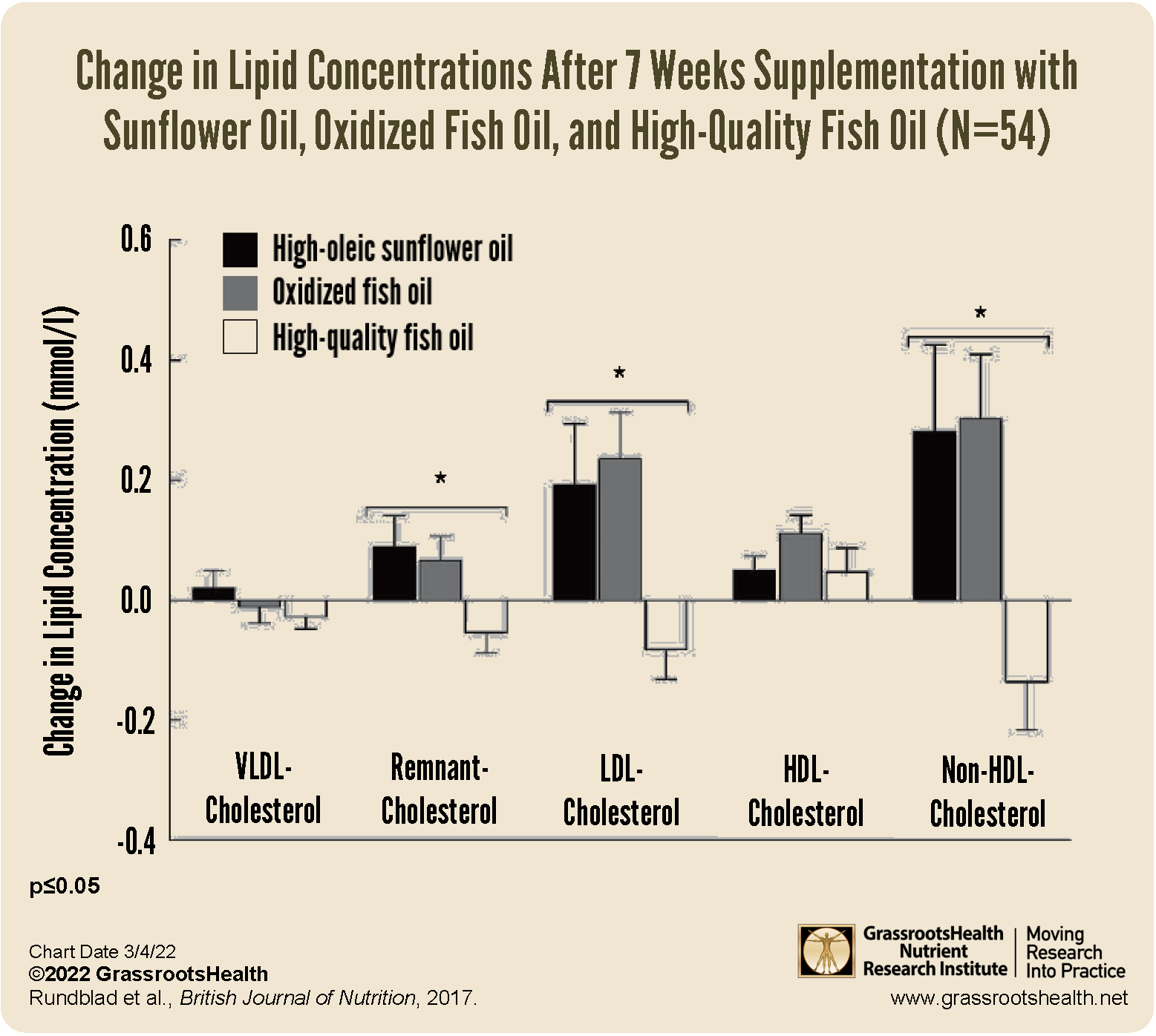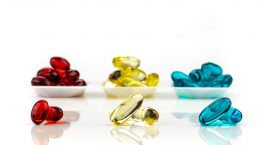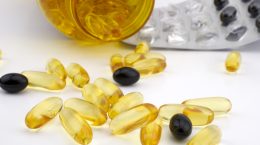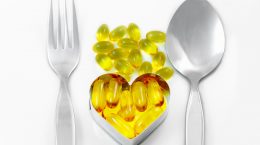Published on March 6, 2022
As many as 50% or more of the omega-3 fish oil supplements on the market are oxidized; why choosing high quality fish oil supplements is essential and how to find them
Key Points
- EPA and DHA from fish oils can provide many amazing health benefits but are also very vulnerable to oxidation, which can have negative effects on health.
- The study reviewed demonstrates the differing effects of oxidized fish oil supplements compared to high quality fish oil supplements on blood lipid values, and the importance of consuming high quality supplements with a lower oxidation value
- Look for third party validation on fish oil supplements for quality testing and practices, and take measures to help prevent oxidation after purchasing your fish oil supplements
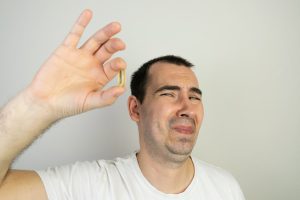
EPA (eicosapentaenoic acid) and DHA (docosahexaenoic acid) are two very important omega-3 fatty acids found in fatty fish and other marine sources, which are essential to our health. Higher omega-3s have been associated with improved cognitive function and cardiovascular health, lower risk of dementia, lower risk of cancer, longer life, and a reduced relative risk for death from any cause, including COVID-19. They are beneficial for normal vision, anti-aging, skin health, maternal health, immune system, brain health, heart health, normal liver function, joints and muscles, and more.
EPA and DHA in Fish Oil Supplements Are Prone to Oxidation
Unfortunately, the EPA and DHA that provide many amazing health benefits are also very vulnerable to oxidation. Oxidized fish oil supplements have been shown to have negative effects on health.
A way to measure the amount of oxidation in fish oil supplements is through using two measurements: the peroxide value (PV) and the anisidine value (AV). According to the Global Organization for EPA and DHA (GOED), the maximum limit for oxidation in fish oil supplements is reached with a PV of 5 mEq/kg or higher and/or an AV of 20 or higher. As many as 50% or more of the omega-3 fish oil supplements on the market exceed one or both of these limits.
What are the Health Consequences of Oxidized Fish Oil Supplements?
A study by Rundblad et al. looked at the effects of oxidized fish oil supplements and high-quality fish oil supplements on specific cholesterol particle measurements using a randomized, double-blind controlled trial. The study enrolled 54 adults between the ages of 18 and 50 years; 17 received high-quality fish oil supplements, 18 received oxidized fish oil supplements, and 19 received high-oleic sunflower oil capsules. Both the high-quality and oxidized fish oil supplements had the same amount of omega-3 fatty acids (1.6g EPA + DHA per day), however, the oxidized fish oil supplements had a PV of 18 mEq/kg and an AV of 9, with a total oxidation value (2PV + AV) of 45. Both the high quality fish oil supplement and the sunflower oil capsules had a total oxidation value of 11. The supplements were given for 7 weeks.
Blood samples were taken at baseline, 3 weeks, and at the end of the 7 weeks, with measurements including routine lipids, lipoprotein subclass profiling with lipid concentrations within fourteen subclasses, fatty acid composition, abundant proteins, and various low-molecular-weight metabolites.
Overall, the study found that supplementing with the oxidized fish oil increased the following, while supplementing with the high quality fish oil resulted in significantly reduced concentrations of
- intermediate-density lipoprotein (IDL) particles
- large, medium and small LDL particles
- total lipids, phospholipids, total cholesterol, cholesteryl esters and free cholesterol in IDL and LDL subclasses
This study demonstrates the differing effects of oxidized fish oil supplements compared to high quality fish oil supplements, and the importance of consuming high quality supplements with a lower oxidation value.
How Do You Choose a High Quality Fish Oil Supplement?
There are several third-party organizations that offer quality stamps of approval for fish oil supplements, including GOED and IFOS (International Fish Oil Standards), both of which have a list of brands that adhere to their set standards of quality, safety, purity, and good manufacturing practices. All quality products should also have a current good manufacturing processes certification (cGMP) to ensure the proper use of design, monitory, and control of processes and facilities.
Tips to help prevent oxidation in your fish oil supplements include
- Storing supplements in opaque bottles or choosing dark-colored softgels
- Storing supplements in a cool place, out of direct sunlight (but not in the freezer!)
- Limiting air exposure by keeping the product bottle sealed when not in use (blister-packs are a great option)
- Toss products that have an extreme, fish-smell odor or are past their expiration date; fish-flavored burps may also be a sign of a rancid supplement
Measure the Omega-3 Index and AA:EPA Ratio to Ensure Proper Omega Intakes
GrassrootsHealth offers several testing options to help measure the status of omega-3 and omega-6 fatty acids – the Omega-3 Index, AA:EPA Ratio, and Omega-6:Omega-3 Ratio. Learn more about these tests and the differences between them here. More information on how to improve these test results can be found here. These and more can be measured with your vitamin D level as part of participation in the D*action project.
 Having and maintaining healthy vitamin D levels and other nutrient levels can help improve your health now and for your future. Choose which additional nutrients to measure, such as your omega-3s and essential minerals including magnesium and zinc, by creating your custom home test kit today. Take steps to improve the status of each of these measurements to benefit your overall health. With measurement you can then determine how much is needed and steps to achieve your goals. You can also track your own intakes, symptoms and results to see what works best for YOU.
Having and maintaining healthy vitamin D levels and other nutrient levels can help improve your health now and for your future. Choose which additional nutrients to measure, such as your omega-3s and essential minerals including magnesium and zinc, by creating your custom home test kit today. Take steps to improve the status of each of these measurements to benefit your overall health. With measurement you can then determine how much is needed and steps to achieve your goals. You can also track your own intakes, symptoms and results to see what works best for YOU.
Enroll in D*action and Test Your Levels Today!


